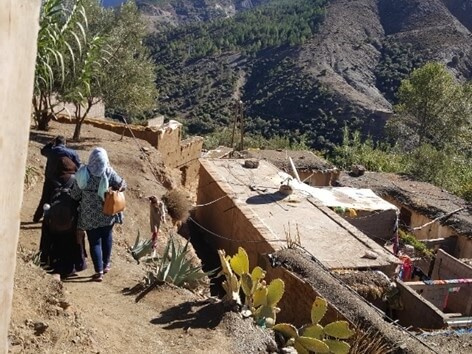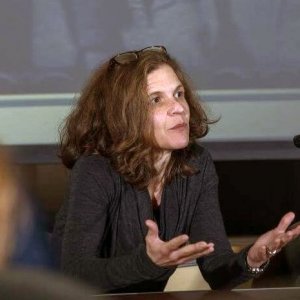Council of Endowed Chairs Lecture Series
2025
Surviving Climate Change in an Authoritarian State
Peter Jacques
Professor, Endowed Chair
Part of the Climate Crisis Teach-in at Monmouth University, and sponsored by the Council for Endowed Chairs and the Institute for Global Understanding
Monday, Feb. 17
4:30–5:50 p.m.
Edison 201

The Indigenous Amazigh people of the High Atlas Mountains in Morocco are one of the world’s oldest cultures, and they have handed down practices that have helped them survive several millennia of environmental changes in North Africa. However, they live under the authoritarian rule of King Mohammed VI and they are prevented from using these tools while at the same time some villages ran out of drinking water two summers ago. How will they survive these next few decades when they face grinding poverty and political oppression? In fact, they have a plan and it is one that everyone should hear.
2024
Green Worlds in Black and White: Feminist Readings of the 1930s Wood Engraving Revival
Kristin Bluemel, Ph.D.
Wayne D. McMurray and Helen Bennett Endowed Chair in the Humanities
Tuesday, Oct. 1
6–7 p.m.
107 Rechnitz Hall

The enchanting black and white pictures featured in this talk tell a forgotten feminist tale of personal freedom and commercial success achieved by women artists whose creations of wood, ink, and paper brought joy and beauty into the dark days of the Great Depression and World War I.
Co-sponsored by the Wayne D. McMurray-Helen Bennett endowed chair in the humanities at Monmouth University. This talk is in connection with the I Wish to Say Teach-In Series and the exhibition of Sheryl Oring’s social practice art projects on display in the DiMattio Gallery.
2020
‘Wake Up to Climate Change’ – Harmful Algal Blooms and Other ‘Nasties’ in Our Coastal Waters
Jason E. Adolf, Ph.D.
Endowed Associate Professor of Marine Science, Biology Department and Urban Coast Institute at Monmouth University
Presented as Part of the 2020 Monmouth University Climate Crisis Teach-In
Oct. 27, 2020
Harmful Algal Blooms (HABs) occur when phytoplankton accumulate and have a negative impact on aquatic ecosystems. Deoxygenation, toxin production, and fish kills are the most visible adverse effects worldwide, and each of these occurs in NJ as well. While HABs and other ‘nasties’ in our coastal waters come from various sources, climate change unfortunately seems to be making the problem worse. This talk will discuss how climate change is expected to impact coastal waters, focusing on HABs and microbial pollution research done by Monmouth University faculty and students in the Phytoplankton and Harmful Algal Bloom lab (PHABLab). Actions suggested or supported by our research results will be discussed as well.
2019
‘What Did ISIS Do to You?’ Media Ethics and the Problematic Reporting on Yazidi Survivors of Sexual Violence

Johanna Foster, Ph.D.
Helen McMurray Bennett Endowed Chair of Social Ethics and Associate Professor of Sociology, Monmouth University
CEC Spring Semester Lecture Series
Sponsored by the Helen McMurray Bennett Endowed Chair of Social Ethics
February 25, 2019
In 2014, the Islamic State of Iraq and Syria (ISIS) brutally attacked the Yazidi people living in towns and villages throughout the Sinjar region of Iraq. The assault was designed to destroy the religious minority group through rape, mass executions, and forced religious conversions. Militants killed an estimated 3,100 Yazidis, mostly men and boys, and abducted another 6,400, predominantly women and children. While thousands still remain in captivity today, months after the attack, thousands of women escaped, and journalists from around the world raced to cover their harrowing experiences as torture survivors. In this lecture, Dr. Foster presents the findings from her collaborative research project on the ways in which reporters in these early months after the attack violated basic ethical standards for reporting on sexual violence in conflict zones, as well as Yazidi women’s own perceptions of the impact of the media frenzy.
